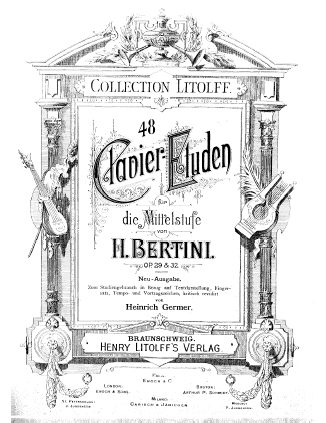Ave Maria
Composer: Henri Jérôme Bertini (1789-1876), s.a.
arr. J. R. Gomis

| X |
X |
X |
X |
X |
|
Henri Jérôme |
|
Bertini |
|
1798 |
1876 |
|
|
|
s.o. |
Ave María |
|
|
No.5 in Cinq Morceaux religieux. |
| X |
X |
X |
X |
X |
|
Henri Jérôme |
|
Bertini |
|
1798 |
1876 |
|
|
|
Op.
29/? |
Ave María |
|
piano |
adaptada de la op. 29
de Bertini
por Gomis, J.R.
(BNE) |

No.5 in: "Cinq Morceaux religieux. Paroles
latines à usage des séminaires, communautés religieuses, chapelles et maisons
d'education. Ave Maris Stella, O Salutaris, Tantum Ergo, Ave Maris Stella,
Ave Maria" (Five religious pieces. Latin lyrics for the use of seminarians,
religious communities, chapels, and places of education...)
| Recording: not available |
|
| MIDI / Lyrics: not available |
|
| Score: not available |
|


adaptada de la op. 29 (No.?) de Bertini
por Gomis, J.R. (BNE)
| Recording: not available |
|
| MIDI / Lyrics: not available |
|
| Score: not available |
Op. 29 available on IMSLP. |
|

|
|

A
biographical dictionary of musicians (ed.
Theodore Baker)
G. Schirmer, 1905 - Biography & Autobiography - 695 pages |

 |
Bertini Henri-Jerome pianist and composer b London
Oct 28 1798 d Meylau near Grenoble Oct 1 1876 When six months old he was
taken to Paris where he was taught by his father and his elder brother
Benoit Auguste played early in public and at 12 made a concert tour through
the Netherlands and Germany He returned to Paris for study spent some time
in Great Britain and from 1S21 59 resided in Paris whence he made many
brilliant artistic tours In 1859 he retired to his estate at Meylau Both as
pianist and composer he was a musician of the highest talent and lofty
ideals unalterably opposed to the flashy virtuosity then so much in vogue Mi
technical studies are still of value an excellent selection of 50 has been
edited by G riuonamici an arr of Bach's 4S Preludes and Fugues f 4 hands is
also useful He also wrote much chamber music and pes f pf solo over 200
works in all
=================================
Bertini Domenico born Lucca June 26 1829 d Florence Sept 7 1890
Pupil of Michele Puccini 1857 Director of the mus inst at Massa di Carrara
also m di cupp went to Florence in 1862 as singing teacher and critic and
became director of the Cheru bini Society Contributor to the Bocclierini of
Florence La Scena of Venice and other periodicals lie comp 2 operas masses
magnificats and chamber music also wrote Com pendio di principi di musica
secondo un nuovo sistema 1SO6 |
|
http://en.wikipedia.org/wiki/Henri_Bertini retrieved 2012-02-16 |
|
Henri Jérôme Bertini (October 28, 1798 – September 30, 1876)
was a French classical composer and pianist.
Henri Jérôme Bertini was born in London on October 28, 1798,[1] but his
family returned to Paris six months later. He received his early musical
education from his father and his brother, a pupil of Muzio Clementi. He was
considered a child prodigy and at the age of 12 his father took him on a
tour of England, Holland, Flanders, and Germany where he was
enthusiastically received. After studies in composition in England and
Scotland he was appointed professor of music in Brussels but returned to
Paris in 1821. It is known that Bertini gave a concert with Franz Liszt in
the Salons Pape on April 20, 1828. The program included a transcription by
Bertini of Beethoven's Symphony No. 7 in A major for eight hands (the other
pianists were Sowinsky and Schunke.) He was also admired as a chamber music
performer, giving concerts with his friends Antoine Fontaine (violin) and
Auguste Franchomme (cello). He remained active in and around Paris until
around 1848 when he retired from the musical scene. In 1859 he moved to
Meylan (near Grenoble) where he died on September 30, 1876.
Bertini concertized widely but was not as celebrated a virtuoso as either
Friedrich Kalkbrenner or Henri Herz. One of his contemporaries described his
playing as having Clementi's evenness and clarity in rapid passages as well
as the quality of sound, the manner of phrasing, and the ability to make the
instrument sing characteristic of the school of Hummel and Moschelès.[2]
Thomas Tapper wrote:
He was in his time a shining example of the most admirable qualities of an
artist. Living in an age of garish virtuosity, and hailed as a brilliant
executant himself, he maintained nevertheless the most rigorous standards of
musicianship in his playing, in his compositions, and in the music which he
appeared before the public to interpret. This is the more remarkable when
one considers that his manhood was reached during the luxuriant period of
French romanticism and that the extravagances of the literary outburst were
reflected in the musical movements of the time. Virtuosity was subjected to
sore temptations and many succumbed. Bertini stood for the sounder qualities
of the artist and gradually acquired an extended and remunerative prestige.
His life was singularly devoid of incident and official distinction, but the
legacy of pedagogic works which he has left to us and his honorable activity
give it every right to be called a success.[3]
Bertini was celebrated as a teacher. Antoine Marmontel, who devoted the
second chapter of his work on celebrated pianists to Bertini, wrote
He was unsurpassed as a teacher, giving his lessons with scrupulous care and
the keenest interest in his pupils' progress. After he had given up
teaching, a number of his pupils continued with me, and I recognized the
soundness of the principles drawn from his instruction.[2]
It is above all in the special class of studies and caprices, that Bertini's
immense popularity is founded. It is here that he occupied a unique position
and opened the path over which the next generation of composers was to rush
after him. In each of his numerous collections of studies, embracing every
degree of difficulty, he has insistently given to every piece, easy or
difficult, brief or extended, a character of salient melody. The technical
problem to be overcome presents itself as a song; even where the study is
devoted to the problem of velocity the general contour falls into a melodic
curve, and this is the first and transcendent cause of the universal success
of these pieces, which are, furthermore, natural in respect to rhythm and
carefully thought out harmonically.[4]
Robert Schumann, in a review of one of Bertini's piano trios in the
Gesammelte Schriften, comments that Bertini writes easily flowing harmony
but that the movements are too long. He continues: "With the best will in
the world, we find it difficult to be angry with Bertini, yet he drives us
to distraction with his perfumed Parisian phrases; all his music is as
smooth as silk and satin."[5] German sentimentality has never appreciated
French elegance.
Bertini is best remembered today for his piano method Le Rudiment du
pianiste, and his 20 books of approximately 500 studies.
Music Published
Without Opus:
 |
Cinq Morceaux religieux. Paroles latines à usage
des séminaires, communautés religieuses, chapelles et maisons d'education.
Ave Maris Stella, O Salutaris, Tantum Ergo, Ave Maris Stella, Ave Maria
(Five religious pieces. Latin lyrics for the use of seminarians, religious
communities, chapels, and places of education...) |
|
 
Please notify us of any broken/defective links

Page last modified:
February 16, 2012
Return to my homepage:
www.avemariasongs.org

|
![]()